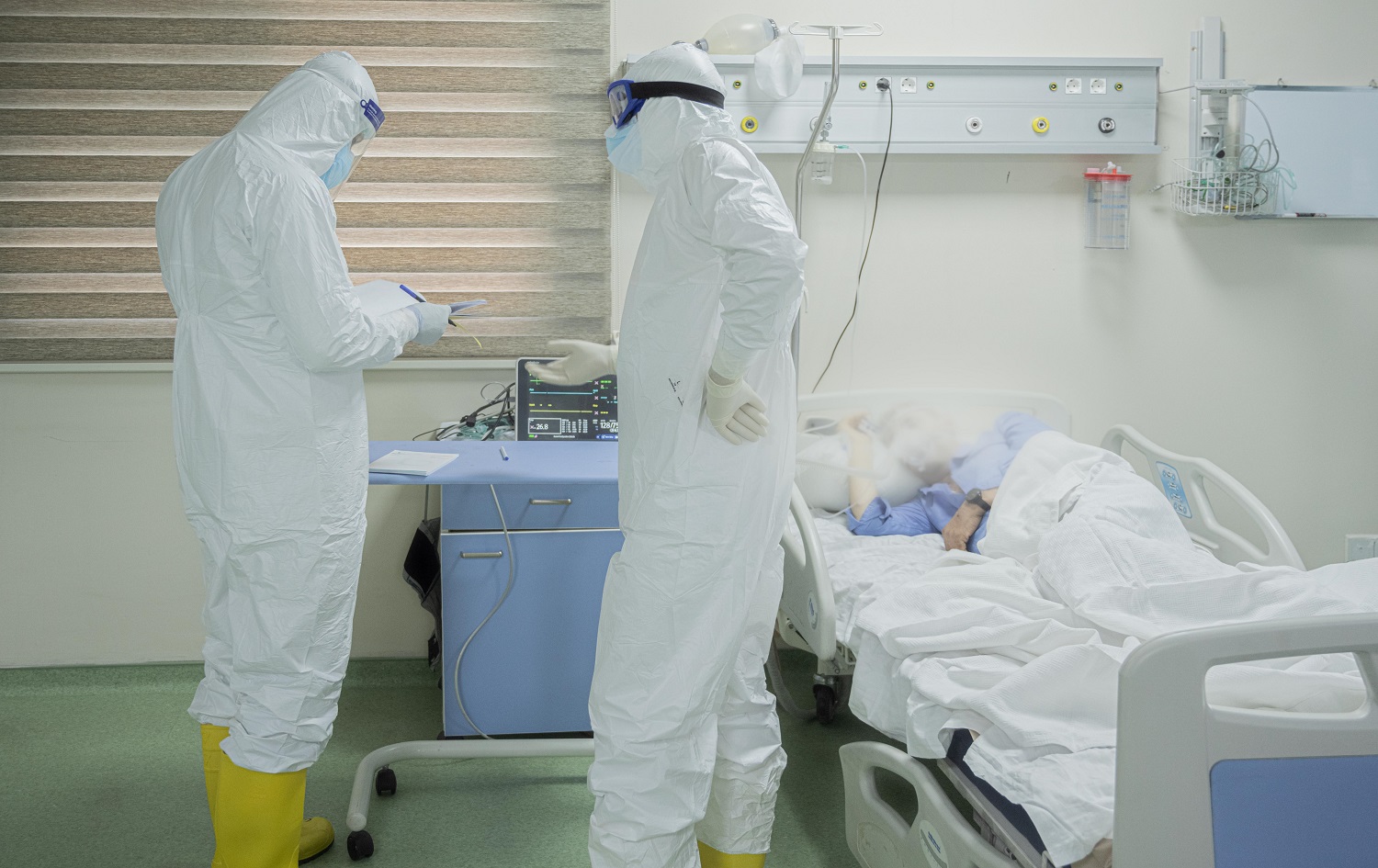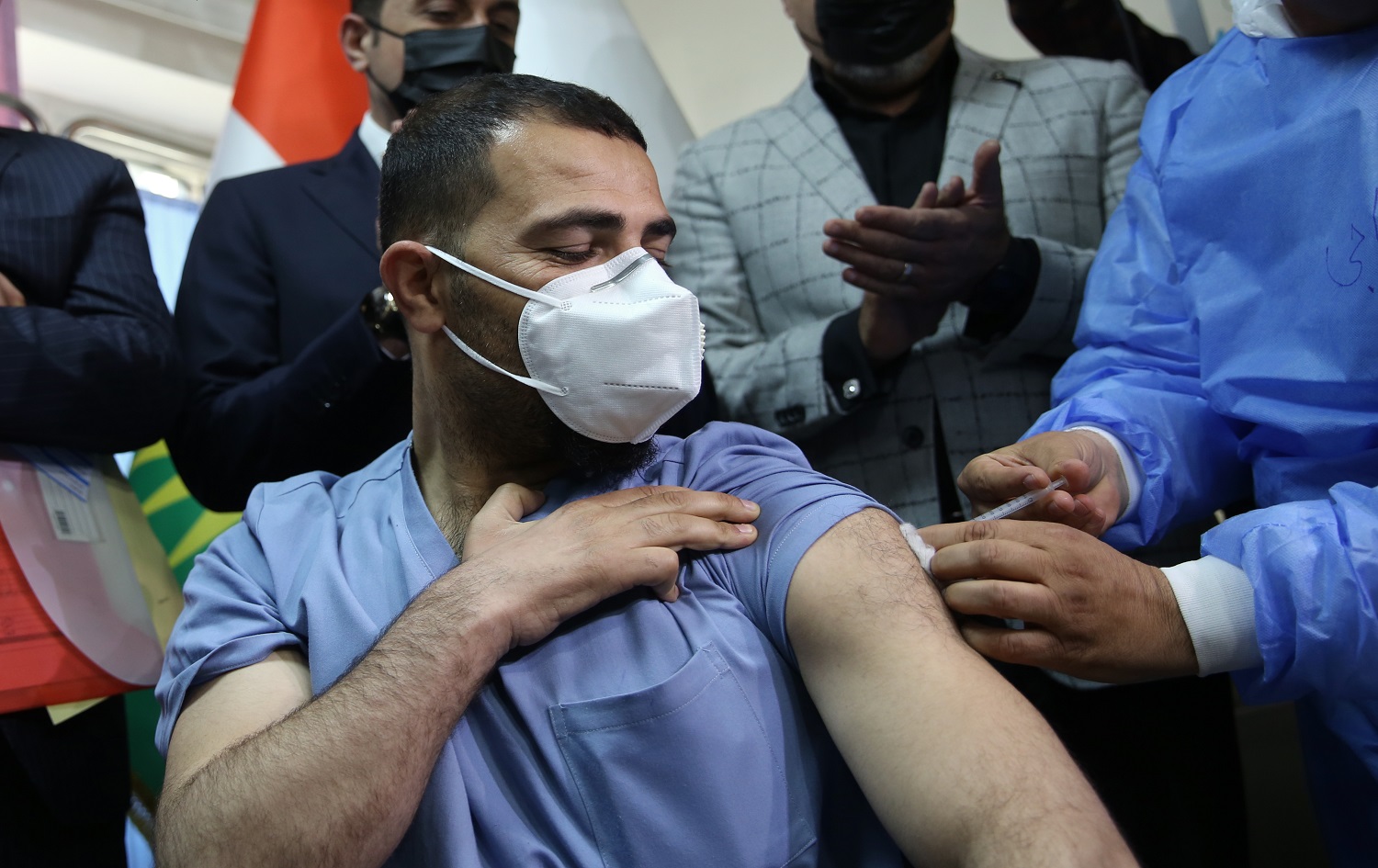ERBIL, Kurdistan Region — The elevator dings when it arrives on the third floor of a private hospital for coronavirus patients in Erbil. I take one last look at my reflection in the mirror, noticing the dark circles under my eyes screaming for sleep. I step out of the elevator to face the unknown that is slowly sucking the life out of me.
Nurses in blue gowns and face masks say good morning to me. I give them a sad smile from underneath my mask as I gently carry freshly homemade juice to the last room on the left of the corridor. Stepping inside, I am welcomed by beeping machines, tracheal tubes, and a ventilator attached to a man whose strength once shook mountains, my father. I softly kiss his hands, rubbing my thumb across bruises from the IV.
I place the juice in the fridge, his meal for breakfast, lunch, and dinner, and sit on the chair next to his bed, watching his oxygen levels jump from 88 to 94. It's going to be okay, I whisper to myself as the machines blow another breath into my father's body. A voice pulls me back from my thoughts and I quickly stand to help the nurse feed my father through the tube inserted into his nose. She asks me if he has opened his eyes today and I shake my head. Giving me a downhearted smile, she leaves me to my thoughts.
The coronavirus pandemic started in December 2019 in Wuhan, the capital of China's Hubei province. As COVID-19 quickly spread through the world, so too did fear of the havoc this virus could wreak on our bodies and society. The virus presented an immediate danger to communities across the world, impacting jobs, families, and changing how we communicate, with education and business moving online.
Making it difficult for people to breathe, the coronavirus arrived in the Kurdistan Region in early 2020. The number of cases started growing day by day, and a year and a half after the detection of the first case, the rate of infections is at a record high.
Hospitals focused on fighting the disease that has killed nearly four million people around the globe and over four thousand in the Kurdistan Region. Many nurses and doctors, including my father, spent countless hours and long days with patients, helping them battle the virus, a fight they often lost.
"As nurses, we were very scared of the virus because we had direct contact with patients. We didn't know how to deal with the patient. For example, we thought if we stand in front of an infected person then we would contract the virus too," Didar Muhsin Mawlod, the head of nurses at one of Erbil's private hospitals, told Rudaw English about the first days and weeks confronting this unknown virus.
"What you see on TV is very different from what you see at hospitals," he added. "Sometimes you have to give up your personal life to save patients' lives."
The World Health Organization (WHO) declared the outbreak a Public Health Emergency of International Concern on January 30, 2020, and a pandemic on March 11 of the same year. The virus started spreading faster, across borders. Iraq confirmed its first case in the city of Najaf on February 24, while the Kurdistan Region reported its first confirmed case on March 1.
The Kurdistan Regional Government (KRG) quickly began implementing measures to curb the virus' spread, imposing partial and complete lockdowns. The lockdowns were gradually lifted as rates of infection slowed, allowing shops, mosques, and churches to reopen their doors and non-essential traffic to run through the Region's roads. But when infections started to increase again, the KRG couldn’t afford to shut down businesses. Authorities ordered the public to adhere to safety measurements like wearing masks and practicing social distancing, but they were loosely enforced.
Through our 40-day stay in hospital, my father almost got better. The hope of things getting back to normal coursed through my veins. One day, when I arrived at what eventually started to feel like home, the hospital, one of the nurses took me aside. Her voice still rings in my ears.
"You need to know that your father has been breathing with the help of a machine for weeks now, his body got used to it. It will be hard for his lungs to function by themselves," she said.
With bloodshot eyes, I swallowed the anger down my throat, anger because I knew what that meant. This all doesn't matter, I thought to myself. I crawled back my life to when I was six, eagerly waiting for my father to arrive home from his trips to spoil me with gifts. Fathers are immortal, I whispered to myself as I made my way back to the hospital room that was now my safe haven simply because the man who raised me was there, unconscious. I let loose and broke into tears.
Those were my last days with him.
My father died a few days later in the hospital room where he used to treat patients. His lungs that were made of him failed him in the end. I ran into the room as the nurse was pushing on my father's chest, performing CPR. My vision was blurry. I couldn't see through the tears but I remember holding his hands that grew cold in just seconds. I squeezed his hands. He didn't squeeze mine back.
On Wednesday, the Kurdistan Region recorded 3,123 new cases, bringing the total up to 244,051. And 24 people died of the virus, pushing the death toll up to 4,858. Each one of those numbers is a loved one - a father, a mother, sibling, aunt, cousin, grandparent, child.
Ali* lost his uncle and two of his father's cousins within 40 days of each other. "One of the cousins left a baby that was less than six months old," he told Rudaw English. They died between August and September last year, during a peak of a wave of infections. "It was a horrible time," he said.
Sara* lost her grandmother. "I was not able to say goodbye. Cases were at an all-time high. Hospitals were completely full and they limited the number of people that could visit," she told Rudaw English.
"She had kidney failure and the doctors told her she had to start dialysis immediately," she said.
"There were a bunch of side effects of dialysis we were told to look out for that very easily overlapped with Covid symptoms," she added. Her grandmother died six weeks after contracting the virus.
The pandemic became the reality of everyone around the globe. Long months of quarantine, closed restaurants, and empty shopping centers left cities nearly deserted.
Mina* lost her father in London in the first wave of the virus. "We said goodbye a day before he passed via FaceTime, but he was on a ventilator so he couldn't respond," she told Rudaw English. Staring at her father through the glass, Mina* managed to speak to him on the phone a day before they attached his body to the ventilator.
"He started crying and asked if I had enough money. I think he knew he wasn't going to make it," she said, adding that anyone who hasn't lost someone to the virus should count their blessings, because "many of us weren't that lucky."
In November 2020, Pfizer and BioNTech pharmaceuticals announced vaccine candidates against COVID-19 that achieved success in their first analysis. A number of other companies also announced vaccines against the virus soon after.
Pfizer, AstraZeneca, and Sinopharm are available in Iraq and the Kurdistan Region. The vaccination process began in the Kurdistan Region in early March. Skepticism was high at first, but numbers picked up later, especially after the Region entered its third wave of the virus following WHO's announcement of the new strain known as the Delta variant. According to data shared by the WHO, Iraq has administered 1,087,866 vaccine doses as of July 4, including in the Kurdistan Region.
The new variant is more contagious and spreads very fast, and is expected to be the dominant strain worldwide in the upcoming months. The Kurdistan Region recorded its first case of the Delta variant in mid-July.
The government has opted not to impose a full or partial lockdown, despite calls for such measures from the health ministry.
In the hospitals, there's no end in sight for healthcare workers who have witnessed heartbreak like mine every day on the frontline of the pandemic. Again and again, nurses and doctors had to tell family members, wives, and children that their loved one might not see the next day, let alone make it back home.
"Usually patients die of cancer or a heart attack. It was very unusual for us to see them die because of a virus. It was horrible," said Mawlod.
He is still haunted by the memory of doing CPR on his own relatives - his uncle and cousin. The father and son both lost their lives to the virus.
The stress doctors and nurses face every day is exhausting. "I don't count the past two years with my age," Shakhawan Khailany, head of al-Imarati hospital for coronavirus patients in Erbil, told Rudaw English.
But as hard as it has been, he has no regrets: "I don't regret what I have done for a second. Aside from my occupation and position, what I have done and what I want to do is a humane thing."
*Names have been changed at their request






